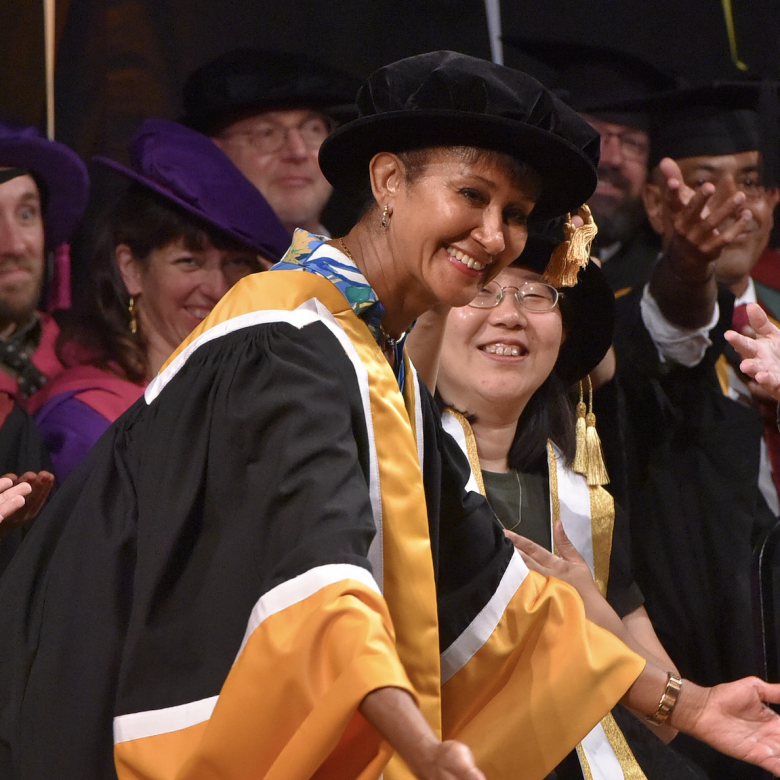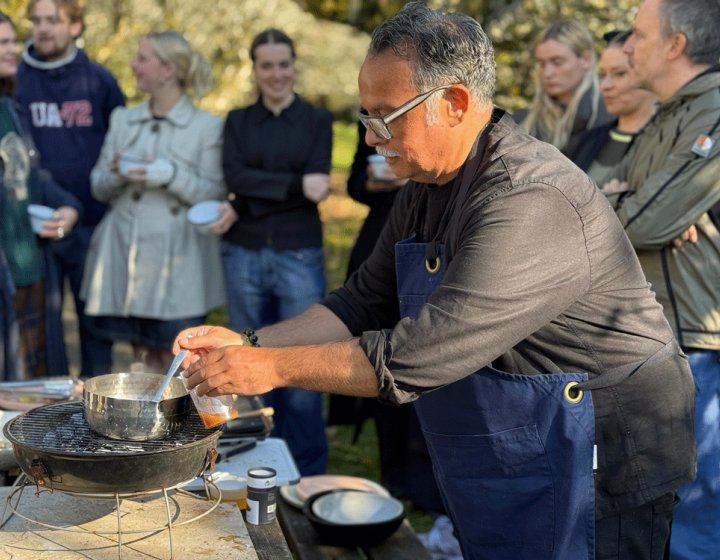“Beyond allyship”: Julie Felix on Black History Month 2022
12 October 2022

Falmouth University’s Honorary Fellow Julie Felix speaks out about casting, creativity and inspiration during Black History Month.
As the UK marks Black History Month in 2022, it’s time to recognise that if we want to see long lasting change and truly stamp out discrimination, if we want to get serious about levelling up opportunity and widening the net so that there’s opportunity for all, we need to move beyond allyship and gestures and move towards action and tangible policies.
Earlier this summer I was honoured to have been recognised as an Honorary Fellow at Falmouth University. It was an extraordinary moment and a memory I will cherish. But anyone vaguely familiar with my story will know it wasn’t all plain sailing.
Before graduating from Rambert Ballet School, I auditioned for Rudolf Nureyev’s Sleeping Beauty in London but was told I’d “mess up” the line of White Swans in the Corps de Ballet, so they couldn’t possibly hire me. I didn’t fit their pre-conceived notion of pale and willowy - a look associated with English ballet at the time.
As we’ve seen recently with the focus on the new leading actress in the role of The Little Mermaid, there’s still a battle for recognition.
That rejection would stay with me, but I certainly didn’t let it hold me back. I ended up working in New York alongside my biggest role model – the incredible Arthur Mitchell. Arthur was the first Afro-American ballet dancer with New York City Ballet, who was promoted to principal dancer and who became the founder of Dance Theatre of Harlem.
The sacrifices that Arthur Mitchell made in order for young black ballet dancers to reach their goals and aspirations was simply incredible. He had the ability to see talent, passion and creativity in a dancer who normally would not have been given the opportunity to pursue their dreams. I know that’s why he offered me a contract with the company because I’d been rejected by a ballet company in the UK.
Of course, then there was my mother. She was an aspiring opera singer who was forced to relinquish her passions and instead focus on her husband and family. She devoted herself to my training and career and was my biggest source of creative inspiration.
My mother instilled in me the need for absolute discipline and as I came from a mixed-race background, she helped me understand that my life would be harder than most but that would be a good thing and it would force me to be the best.
It’s amazing to me that even in 2022, casting for high-profile films and productions attracts so much heat and ire when there is a non-white cast member in a leading role. If there’s a talented artist, it shouldn’t matter what colour their skin happens to be.
As we’ve seen recently with the focus on the new leading actress in the role of The Little Mermaid, there’s still a battle for recognition. Halle Bailey is perfectly suited to the role as Ariel, and I commend Disney for seeing through the colour barrier that still exists today in hiring her.
With the challenges ahead of us with the cost of living and a turbulent economy, there’s a very real danger that the entrenched elitism in some of these artistic forms will only get worse.
The creative industries could potentially be a lonely place if you’re the ‘only one’ of a particular demographic. You must believe in yourself 100%, regardless of possibly being the ‘only’ one of your kind. Never take rejection personally, only learn from it and become stronger. Always be professional and dedicated to your beliefs and that way it can harness super strength and resilience.
Skin colour, social class and postcodes shouldn’t matter when it comes to recognising talent. But as we honour black heritage and culture as part of BHM, I’d like to echo the campaign's plea for “Action Not Words”. We can recognise the absence of black leadership and talent in some of our leading artistic and creative institutions – or we can take serious steps to tackle it with policies and strategies.
We simply can’t afford to miss opportunities for black excellence to be recognised and celebrated.
Where ballet is concerned, we’ve made some great strides in terms of recognition for black dancers. But we mustn’t take our foot off the gas even for a moment. With the challenges ahead of us with the cost of living and a turbulent economy, there’s a very real danger that the entrenched elitism in some of these artistic forms will only get worse.
We need a plurality of voices more than ever – and we simply can’t afford to miss opportunities for black excellence to be recognised and celebrated.
I won’t ever stop fighting for others to be seen and heard and it will remain my life’s mission to support others with their dreams and career goals.




